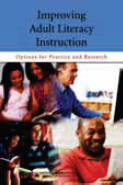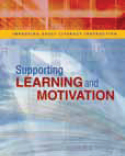Research on Adult
Literacy Instruction
Although the principles and practices described in this booklet can be used to improve literacy instruction, the shortage of research on effective approaches specifically for adults limits the nation’s ability to substantially raise the overall literacy of the population.
Improving Adult Literacy Instruction, the report on which this booklet is based, recommends sustained and systematic research to identify promising instructional methods and to develop and test approaches that could be implemented on a wide scale. Studies are also needed to determine what practices work best with particular groups of learners—those learning English as a second language, for example, and those with learning disabilities. The results of such research can help inform federal, state, and local decisions about how best to support adult learners and improve the nation’s literacy overall.
The principles described here should be further investigated with adult learners, and the curricula, instruction, and assessments developed from the principles should be evaluated for effectiveness with different groups of adult learners. The results of these evaluations, in turn, should be used to refine the instructional principles, interventions, and assessments. In this way, practice and research will build on and strengthen each other in a mutually reinforcing cycle that will increase adult literacy. It is also important to align standards for literacy instruction across the programs and systems that provide literacy instruction—including K-12, adult education programs, and post-secondary education.
Preparing Instructors
Implementing and studying effective literacy instruction requires strong professional development and training of those who teach adults. Currently, adult literacy instructors vary widely in their professional backgrounds and levels of knowledge and expertise. Unfortunately, however, there has been little research on the efficacy of teacher education and professional development and the degree to which it addresses the needs of adult literacy instructors. Literacy development, like the learning of any complex task, requires a range of explicit teaching and implicit learning guided by an expert.
To be effective, literacy teachers need to:
• have significant knowledge of the component skills of reading and writing, including spoken language, and how to teach these components;
• be capable of establishing nurturing relationships and developing a positive, dynamic, and emotionally supportive environment for learning;
• be able to plan activities using clear objectives with deep understanding of reading and writing processes;
• be able to reflect on their teaching and their students’learning and select from a repertoire of instructional strategies accordingly; and
• have a deep knowledge of the English language system.
It will be vital to learn, through systematic research, how best to prepare teachers to be effective instructors for adult literacy learners.
To implement the agenda for practice and research detailed in Improving Adult Literacy Instruction, substantial national leadership will be needed from the U.S. Departments of Education and Labor, as well as other agencies that sponsor relevant research. Success will depend on a strong partnership among the federal government, states, and the many settings where adults receive instruction. Sustained partnerships will also be needed among practitioners, curriculum developers, administrators, and researchers to systematically build the needed knowledge and tools and to identify and address barriers to implementation. Major employers, existing training and education organizations, faith-based groups, and other community groups will need to be enlisted to help in the effort.
ABOUT THIS BOOKLET
This booklet was prepared by the Division of Behavioral and Social Sciences and Education (DBASSE) based on the report Improving Adult Literacy Instruction: Options for Practice and Research (2012) which was authored by the Committee on Learning Sciences: Foundations of and Applications to Adolescent and Adult Literacy. The study was sponsored by the U.S. Department of Education. Any opinions, findings, conclusions, or recommendations expressed in this publication are those of the National Research Council and do not reflect those of the Department of Education.
A PDF of this booklet is available free to download at http://www.nap.edu/catalog.php?record_id=13242. Print copies are available from the National Academies Press at (800) 624-6242 or (202) 334-3313 (in the Washington, DC, metropolitan area) or via the NAP Website at www.nap.edu.
Committee on Learning Sciences: Foundations and Applications to Adolescent and Adult Literacy: ALAN M. LESGOLD (Chair), School of Education, University of Pittsburgh; KAREN COOK, Department of Sociology, Stanford University; AYDIN Y. DURGUNOĞLU, Department of Psychology, University of Minnesota, Duluth; ARTHUR C. GRAESSER, Psychology Department, University of Memphis; STEVE GRAHAM, Special Education and Literacy, Peabody College of Vanderbilt University; NOEL GREGG, Regents’ Center for Learning Disorders and Psychology Department, University of Georgia, Athens; JOYCE L. HARRIS, College of Communication, University of Texas at Austin; GLYNDA A. HULL, Graduate School of Education, University of California, Berkeley; MAUREEN W. LOVETT, Hospital for Sick Children and University of Toronto; DARYL F. MELLARD, School of Education, University of Kansas; ELIZABETH B. MOJE, School of Educational Studies, University of Michigan; KENNETH PUGH, Haskins Laboratories, New Haven; CHRIS SCHATSCHNEIDER, Department of Psychology, Florida State University; MARK S. SEIDENBERG, Department of Psychology, University of Wisconsin—Madison; ELIZABETH A.L. STINE-MORROW, Department of Education and Psychology, University of Illinois; MELISSA WELCH-ROSS, Study Director
ABOUT THE NATIONAL RESEARCH COUNCIL AND DBASSE
The National Research Council is the principal operating agency of the National Academy of Sciences and the National Academy of Engineering. The National Academy of Sciences, National Academy of Engineering, Institute of Medicine, and National Research Council make up the National Academies. They are private, nonprofit institutions that provide science, technology, and health policy advice under a congressional charter. For more information, visit http://national-academies.org.
The Division of Behavioral and Social Sciences and Education (DBASSE)—one of five divisions within the National Research Council—works to advance the frontiers of the behavioral and social sciences and education research and their applications to public policy. DBASSE gathers experts from many disciplines who volunteer their services on study committees to provide independent, objective advice to federal agencies, Congress, foundations, and others through publicly issued reports. For more information on DBASSE’s work, visit http://sites.nationalacademies.org/DBASSE.
Drawing on the latest research evidence, this booklet, Improving Adult Literacy Instruction: Developing Reading and Writing, gives an overview of how literacy develops and explains instructional practices that can help adults learn to read and write. Intended to be a useful resource for those who design or administer adult literacy courses or programs, this booklet may also be of interest to teachers and tutors.
Also of Interest…

This booklet, Developing Reading and Writing, is drawn from the National Research Council’s report Improving Adult Literacy Instruction: Options for Practice and Research. The report recommends a program of research and innovation to gain a better understanding of adult literacy learners, improve instruction, and create the supports adults need for learning and achievement. The report also identifies factors that affect literacy development in adolescence and adulthood and examines their implications for strengthening literacy instruction for this population. In addition, the report explores technologies that show promise for supporting adult literacy learners.
The report is a valuable resource for curriculum developers, federal agencies, literacy program administrators, educators, and funding agencies.

A companion to this booklet, Improving Adult Literacy Instruction: Supporting Learning and Motivation, explains principles that instructors can follow to support literacy learning and students’ motivation to persist in their studies. The booklet also explores promising technologies for adult literacy instruction.
Copies of both booklets are available from the National Academies Press, 500 Fifth Street, N.W.,
Washington, DC 20001; (800) 624-6242; http://www.nap.edu.




